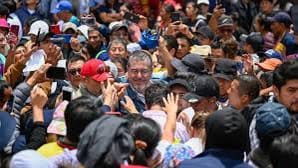Fears of meddling as Guatemala prepares for tense runoff vote

Guatemalans will vote Sunday in a presidential runoff tainted by efforts to disqualify the surprise frontrunner, whose promise to crack down on corruption has fired up voters.
Three decades after the end of a brutal civil war, the Central American nation is dogged by poverty, violence, and graft, sending thousands abroad every year in search of a better life, many to the United States.
Reformist outsider Bernardo Arevalo pulled off a massive upset by finishing second in the first round, and will face off against Sandra Torres in the runoff. A recent poll shows Arevalo with a strong lead.
Both are social democrats, meaning Guatemala will have its first leftist leader in over a decade.
The shock first-round result was followed by efforts to disqualify Arevalo’s Semilla (Seed) party and raids on their offices as well as those of the electoral tribunal, raising alarm among foreign allies over efforts to undermine the vote.
“The real power of democracy comes from respecting the will of the people,” Brian Nichols, the top US diplomat for Latin America, posted Friday on social media in reference to Guatemala’s election.
“It’s no secret that we are very worried,” Organization of American States (OAS) secretary general Luis Almagro said a week before the vote.
Arevalo, a 64-year-old sociologist, claims to be the victim of “political persecution by a corrupt minority that knows it is losing power by the day.”
- ‘Corrupt and undemocratic’ –
Just days before the vote, anti-graft prosecutor Rafael Curruchiche, who has led the campaign against Arevalo, said he did “not rule out” more raids and possible arrests after the elections.
Curruchiche, who is under US sanctions for being “corrupt and undemocratic,” was appointed in 2021 after his predecessor was sacked and fled to the United States in fear for his life.
Arevalo is leading with 50 percent according to the most recent poll by CID Gallup and the Freedom and Development Foundation, with Torres trailing at 32 percent.
Torres, 67, is the ex-wife of deceased leftist president Alvaro Colom and is taking her fourth shot at the presidency.
On Friday, Torres suggested the electoral tribunal was backing Semilla, saying “we question this electoral process, we are very concerned about any alteration of data.”
She also repeated concerns raised by the prosecutor Curruchiche, who has targeted Semilla over alleged irregularities in the collection of signatures when it was formed in 2017.
The victor will replace unpopular right-wing President Alejandro Giammattei, who served the legally allowed one-term limit.
Observers have decried state efforts to protect a corrupt system benefiting those in power under Giammattei, with several prosecutors and journalists detained or forced to flee into exile.
The corrupt “have progressively taken control of all state institutions,” former attorney general Claudia Paz y Paz — who is now exiled in Costa Rica — told AFP.
- ‘Maybe I will stay’ –
The first round in June saw low voter turnout and more than 17 percent of invalid ballots cast, with little hope among Guatemalans that their fortunes would change.
However the arrival of Arevalo — the son of Juan Jose Arevalo, Guatemala’s first democratically-elected president after decades of dictatorship — has shaken up the election race.
“As young people we hope that the country will change … and that every youth without a job will have one because of the new government,” said nursing student Wilson Itzep, from the western town of Chinique.
“Yes, I have felt the need to emigrate due to the lack of work, and poverty. But if Semilla wins, maybe I will stay.”
Arevalo told AFP in an interview in June that his priority would be cracking down on graft.
Guatemala has some of the worst poverty, malnutrition and child mortality rates in Latin America, according to the World Bank.
The murder rate is one of the highest in the world, with many killings attributed to gang violence related to drug trafficking.
Both candidates oppose the legalization of same-sex marriage and elective abortion in the staunchly Catholic country.
Some 9.4 million of the country’s 17.6 million people are eligible to vote when polls open at 7:00 am (1300GMT). Voting will end at 6:00 pm with first results expected later that evening.
The victor will take power on January 14.
©️ Agence France-Presse












